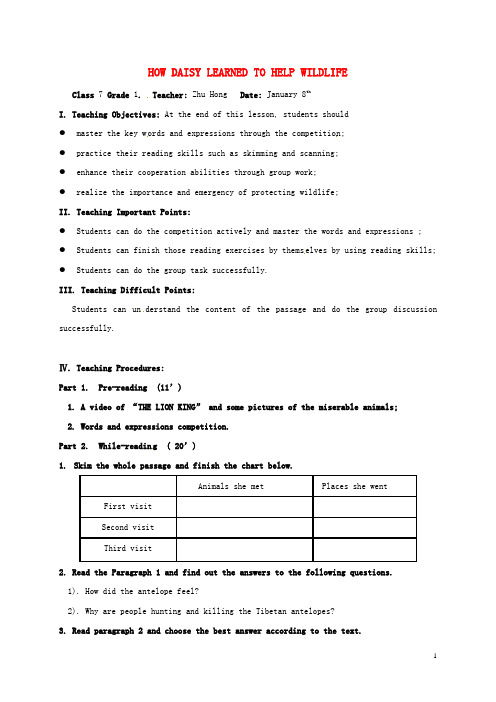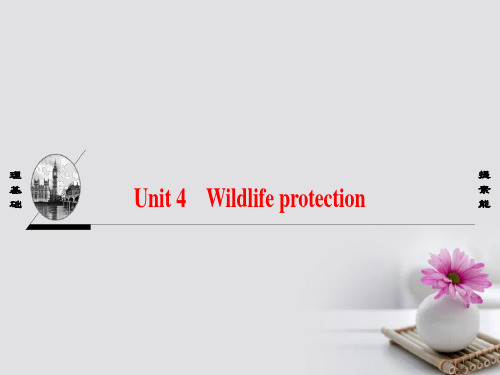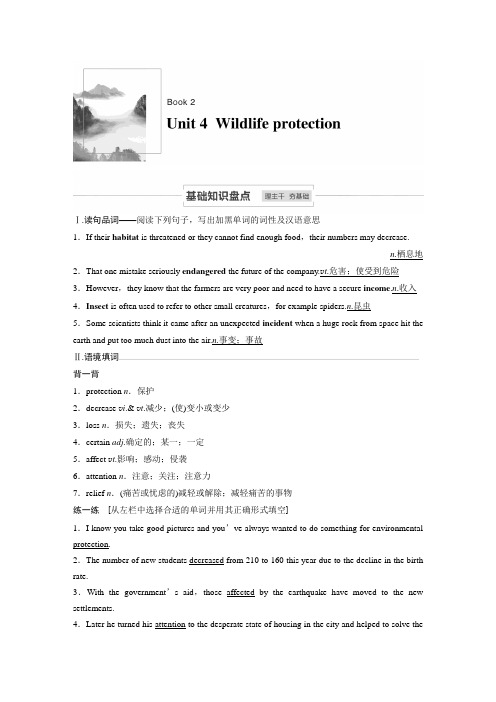浙江省杭州求是高级中学高中英语《Unit4 Wildlife Protection reading》教案 新人教版必修2
- 格式:doc
- 大小:55.50 KB
- 文档页数:2

Unit 4 Wildlife protection很多野生动物迅速灭绝,越来越多的人意识到保护野生动物的重要性。
Significance of Wildlife ProtectionWith the rapid extinction of many wild species, more andmore people come to realize the great significance ofwildlife protection.Now people are realizing the problem in a new light thatwe protect ourselves through protecting wildlife.On the onehand, species of wildlife, as a critical joint of the ecological chain, helps to establish the ecological balance.If one species becomes extinct,it will disappear forever.What is more,it will inevitably result in a chain of wildlife extinction and the damage of the balance.Unpredictable disasters may occur.On the other hand, with the development of modern science and technology, man is just beginning to learn from wildlife.It is important for us to protect wildlife now before it is too late, because man has already polluted the environment seriously and threatened the existence of many wild species.Let's take action to protect wildlife.I have some suggestions.First, the governments should make laws to prevent them from being caught and killed.Second, the governments should educate people to love nature and protect it.Third, as for ourselves, we should take practical actions to protect our living environment.Learning to live in harmony with all wildlife is part of modern civilization.1.critical adj.决定性的2.establish vt.建立3.inevitably adv. 不可避免地4.unpredictable adj.不可预知的5.existence n. 存在6.harmony n. 协调1.List the importance of wildlife protection:2.What should we do to protect wildlife?【答案】 1.①Establishing the ecological balance.②Man can learn from wildlife.2.①Making laws;②Educating people;③Taking practical actions.Section ⅠWarming Up & Reading-Preparing根据提示写出下列单词1.n.保护2.vt. & vi.减少;(使)变小/少3.n. 损失;遗失;丧失4.n. 保护区5.vt. & vi.打猎;猎取;搜寻6.vi. 回答;响应;做出反应7.adj. 远的;远处的8.n. (痛苦或忧虑的)减轻或解除;减轻痛苦的事物9.n. 仁慈;宽恕;怜悯10.adj. 确定的;某一;一定11.n. 重要(性)12.vt.包含;容纳;容忍13.adj. 强大的;有力的14.vt.影响;感动;侵袭15.vt.鉴赏;感激;意识到16.vi. 成功vt.接替;继任17.adj. 安全的;可靠的18.n. 收入19.vt.雇用;利用(时间、精力等)20.n.& vt.损害;危害【答案】 1.protection 2.decrease 3.loss4.reserve 5.hunt 6.respond 7.distant 8.relief9.mercy 10.certain 11.importance 12.contain13.powerful 14.affect 15.appreciate16.succeed 17.secure 18.income 19.employ 20.harm根据提示补全下列短语1.die 灭亡;逐渐消失2. peace 和平地;和睦地;安详地3. danger(of) 在(……的)危险中;垂危4. relief 如释重负5.burst laughter 突然大笑起来6.protect... ... 保护……不受……(危害)7.pay attention 注意8.long sth. 渴望做某事9. mercy 毫不怜悯地10.do harm 对……有害【答案】 1.out 2.in 3.in 4.in 5.into 6.from7.to 8.to do 9.without 10.to根据提示补全下列教材原句1.Please take me to a distant land .请带我到一个遥远的地方,在那里我可以找到一种动物,用它的毛来制作这样的毛衣。

HOW DAISY LEARNED TO HELP WILDLIFEClass 7 Grade 1. Teacher: Zhu Hong Date: January 8thI. Teaching Objectives: At the end of this lesson, students should●master the key w ords and expressions through the competition;●practice their reading skills such as skimming and scanning;●enhance their cooperation abilities through group work;●realize the importance and emergency of protecting wildlife;II. Teaching Important Points:●Students can do the competition actively and master the words and expressions ;●Students can finish those reading exercises by thems elves by using reading skills;●Students can do the group task successfully.III. Teaching Difficult Points:Students can un derstand the content of the passage and do the group discussion successfully.Ⅳ. Teaching Procedures:Part 1. Pre-reading (11’)1. A video of “T HE LION KING” and some pictures of the miserable animals;2. Words and expressions competition.Part 2. While-readin g ( 20’)1.Skim the whole passage and finish the chart below.Animals she met Places she went First visitSecond visitThird visit2. Read the Paragraph 1 and find out the answers to the following questions.1). How did the antelope feel?2). Why are people hunting and killing the Tibetan antelopes?3. Read paragraph 2 and choose the best answer according to the text.1). Why is the number of elephants increa sing in Zimbabwe?A. Because more elephants have come to Zimbabwe.B. Because farmers are happy and no longer kill them;C, Because those elephants don’t destroy farms any more.2). How does the government of Zimbabwe help protec t wild animals?A. It allowed tourists to hunt a small number of animals if they paid the farmers;B. It forced farmers to protect the animals.C. It put m ore wild animals into Zimbabwe.4. Read paragraph 3 and fill in the blanks.When the carpet and Daisy came to ___ ___ ______, they saw a _______ rubbing itself with a millipede _______, which can ______ mosquitoes because it ______ a powerful drug. The money told Daisy to pay more ________to the rainforest and _____ how the animals live t ogether. No forest, no animals, no _____.5.True or False statements.1. Daisy saw many antelopes in Tibet.2. Daisy’s sweater was made of sheep wool.3. The elephant used to be well protected in Zimbabwe.4. In Zimbabwe, tourists love to see the elephants.5. The farmers in Zimbabwe get nothing from the elephants now.6. This is a real story in Daisy’s life.Part 3. Post-reading ( 8’)1.Ask “Daisy” to talk about her feeling;2. Discussion: What should we do to protect wildlife?3. See a short video of Jackie Chan.Part 4. Summary and Wri ting ( 1’)Write a short passage based on the discussion.。


《Unit 4 wildlife_protection》优秀说课稿Wildlife ProtectionGood morning, respected professors, it’s my great pleasure to be here sharing my lessons with you. The content of the lesson is Senior English for China Student’s Book 2 Unit 4 Wildlife protection. I’ll begin the lesson from the following six parts, the teaching material, teaching goals and important and difficult points,the teaching and studying methods, the teaching procedure and blackboard design. First, let me talk about the teaching material.Part1 the Teaching MaterialThis unit is to introduce to us the importance of wildlife protection. The reading passage is the center of this unit. It is made up of 3 paragraphs, that is, why we need wildlife protection, a good example of wildlife protection and what we can get from wildlife protection. The text is the most important teaching material in this lesson, which extends the main topic “wildlife protection” and contains most of the vocabulary and grammar points that students should learn in this unit.Part2 Teaching Aims and important and difficult pointsKnowledge aims:(1)to help students to understand and master the words, phrases and sentence patterns.(2)to know some basic information about the endangered animals and wildlife situation and protection.Ability aims:(1)To improve the students’ organizing and using skills of English as the second language(2) To understand the main idea, to scan for the needed information and to grasp the detailsEmotional aims:(1)Help students understand the importance of the wildlife protection and make them be more active in the helping wildlife.(2)Develop students’ sense of cooperative learningTeaching Key Points And Difficult Points:Teaching Key Points:1. To help the students get a general idea of the whole passage, and some detailed information and language points as well.2. To understand the importance of wildlife protection and then do something for wildlifeTeaching difficult points :1. The students use their own words to express their own ideas.2. the usage of present progressive passive voice.Part3Analysis of the StudentsAlthough the students have the basic abilities of listening, speaking, reading, and writing, they still need many opportunities to practice what they have learned, to express their ideas, feelings, and experience and to develop their autonomous learning ability and cooperative learning ability.Part4 Teaching and Learning MethodsTeaching Methods:municative Language TeachingLanguage is used for communi cation.It’s learner-centered and emphasizes communication and real-life situations.b. Task-based Language TeachingA task resembles activities which our students or other people carry out in everyday life, Learners should be given opportunities to reflect on what they have learned and how well they are doing.c. Computer Assisted Language TeachingLanguage learning needs a context, which can help the learners to understand thelanguage and then can product comprehensible output, so computer has the advantages to make the materials attractiveLearning Methods:Task-based, self-dependent and cooperative learning.Part 5 Teaching ProcedureStep 1 Lead-in“Interest is the best teacher.” Therefore, at the very beginning of the class, I sho uld spark the students’ mind to focus on the centre topic “the importance of wildlife protection”I’ll show them some beautiful pictures of wild animals, such as lions, Tibet antelopes, monkeys and so on. Ask them what they know about those animals. The answers must relate to their present situation, such as die out, dangerous, decrease and so on.After this, the students will be eager to something about the endangered wildlife and this is the very time to naturally lead the class into Step 2.Step 2 Reading for information: skimming and scanningIn this step, I use Task-based Language Teaching method, which can give students a clear and specific purpose while skimming and scanning the context.Task 1 General ideaThe students will be asked to just glance at the title and the pictures of the passage, and then guess what they will read in the text. And they’ll be divided into groups of four to have a discussion. The purpose is to inspire the students to read actively, not passively. In addition, the task is to develop the students’ reading skill by making prediction and to encourage the students to express their thoughts in English and cooperate with each other.Task 2 Main idea of each paragraphCooperative learning can raise the students’ int erest and create an atmosphere of achievement. Based on this theory, I divide the whole class into 3 groups to skim the whole text and get the main idea of each paragraph.Step 3 Reading for comprehensionThe purpose of reading is to get the correct and useful information. Students should not only have a high speed of reading but also have a correct understanding of details. Therefore the following practices on Page 27 can help check the situation.Step 4 Solving difficult language problems through readingIt’s important for language learners to learn important rules of grammar and use these rules to solve problems in reality. In the previous process of reading, the students must come across some difficult language obstacles, so it’s necessary for us to discuss and explain. This period of time belongs to students. They can ask any questions they come across in the process of learning. I’ll explain the questions and difficulties. The purpose of this is improving the students “questioning spirit” and dealing with the difficulties.Step 5 ConsolidationLanguage is learnt by communicating. It is my job to create an atmosphere for students to use the language. Here I design 2 activities1 Role readThe text is concentrated on the conversation between Daisy and Tibet antelope, elephant and monkey. Role read is a good chance to practice English in a cooperative learning atmosphere.2 DiscussionDuring making discussion, the students will deepen their understanding of the severe situation of wildlife and the importance of wildlife protection.1. Why is it important to protect wildlife?2. What must be done if wildlife protection is to succeed?Step 6 HomeworkAsk the students to write down their opinions about what they should do to protect the wild animals. The assignment enables the students to search various information resources, which can widen their view and continue to inspire their enthusiasm of learning.Part 6Blackboard design。


(浙江专版)2018版高中英语Unit 4 Wildlife protection Section ⅢLearning about Language &Using Language学业分层测评新人教版必修2编辑整理:尊敬的读者朋友们:这里是精品文档编辑中心,本文档内容是由我和我的同事精心编辑整理后发布的,发布之前我们对文中内容进行仔细校对,但是难免会有疏漏的地方,但是任然希望((浙江专版)2018版高中英语Unit 4 Wildlife protection Section ⅢLearning about Language &Using Language学业分层测评新人教版必修2)的内容能够给您的工作和学习带来便利。
同时也真诚的希望收到您的建议和反馈,这将是我们进步的源泉,前进的动力。
本文可编辑可修改,如果觉得对您有帮助请收藏以便随时查阅,最后祝您生活愉快业绩进步,以下为(浙江专版)2018版高中英语Unit 4 Wildlife protection Section ⅢLearning about Language &Using Language学业分层测评新人教版必修2的全部内容。
Unit 4 Wildlife protection Section Ⅲ Learning about Language&Using LanguageⅠ。
单句语法填空1.It was not long I realized I was wrong。
2.She had to walk home with her bike (steal).3.It was strange that nobody (inspect) my ticket before I got on the train.4.The two companies fought (fierce) over the market。


高中英语Unit4Wildlifeprotection 试题 2019.091,I believe that you ________________________________ animals and plants disappearing.2,尽管我有些观点跟他不同,我喜欢与他一起干活。
I enjoy working withhim,__________________________________________.3,你知道恐龙为什么在大约65万年前突然灭绝了?Do you know ________________________________________about 65 million years ago?4,你还知道那些其他濒临灭绝的物种吗?What other ___________________________________________ do you know?5,我们能做些什么来保护麋鹿,使他们不会再次消失?What can we do__________________________________________________ disappearing again?6,人们相信,总有一天会有足够多的动物再次在野外生活。
It __________________________ one day there will be enough animals living in the wild again.7,从现在起,我将更加关注野生动植物的保护。
I will ______________________________ wildlife protection _______________.8,我午饭更喜欢吃蛋糕,不喜欢吃面条。
I ____________________ some cakes for my lunch ______________________ noodles.9, 给熊猫造一个新家的项目正在开发中。

Ⅰ.读句品词——阅读下列句子,写出加黑单词的词性及汉语意思1.If their habitat is threatened or they cannot find enough food,their numbers may decrease.n.栖息地2.That one mistake seriously endangered the future of the company.v t.危害;使受到危险3.However,they know that the farmers are very poor and need to have a secure income.n.收入4.Insect is often used to refer to other small creatures,for example spiders.n.昆虫5.Some scientists think it came after an unexpected incident when a huge rock from space hit the earth and put too much dust into the air.n.事变;事故Ⅱ.语境填词背一背1.protection n.保护2.decrease v i.& v t.减少;(使)变小或变少3.loss n.损失;遗失;丧失4.certain adj.确定的;某一;一定5.affect v t.影响;感动;侵袭6.attention n.注意;关注;注意力7.relief n.(痛苦或忧虑的)减轻或解除;减轻痛苦的事物练一练[从左栏中选择合适的单词并用其正确形式填空]1.I know you take good pictures and you’ve always wanted to do something for environmental protection.2.The number of new students decreased from 210 to 160 this year due to the decline in the birth rate.3.With the government’s aid,those affected by the earthquake have moved to the new settlements.4.Later he turned his attention to the desperate state of housing in the city and helped to solve theproblem.5.He may need time to recover from the loss of a loved pet.Ⅲ.拓展提升背一背1.hunt v t.& v i.打猎;猎取;搜寻→hunting n.打猎;搜索→hunter n.猎人2.respond v i.回答;响应;做出反应→response n.回答;响应3.distant adj.远的;远处的→distance n.远方4.contain v t.包含;容纳;容忍→container n.容器5.appreciate v t.鉴赏;感激;意识到→appreciation n.欣赏;感激;理解6.succeed v i.成功v t.接替;继任→success n.成功→successful adj.成功的7.employ v t.雇用;利用(时间、精力等)→employee n.雇员,雇工→employer n.雇主→employment n.雇用;使用;就业8.harm n.& v t.损害;危害→harmful adj.有害的→harmless adj.无害的练一练[用所给单词的正确形式填空]1.The hunter agreed to take us to go hunting tomorrow.(hunt)2.The employer decided to employ Tom as her secretary and she hoped to have a talk with her employee before he came to work.(employ)3.He succeeded to his father’s estate and eventually became a successful businessman.(succeed) 4.I would appreciate it if you had appreciation of the difficulties we faced.(appreciate)5.Not all bacteria is harmful(harm) to us in life,which is obvious.Ⅳ.选词填空背一背1.die out灭亡;逐渐消失2.in peace和平地;和睦地;安详地3.in danger (of)在危险中;垂危4.in relief如释重负;松了口气5.burst into laughter突然笑起来;大声笑了出来6.protect...from保护……不受……(危害)7.pay attention to注意8.do harm to对……有害;损害……9.come into being/existence形成;产生10.according to按照;根据……所说练一练[从左栏中选择合适的短语并用其正确形式填空]1.According to what he said,he didn’t get what he had wanted.2.They lived on the earth tens of millions of years ago,long before humans came into being. 3.We should pay attention to protecting the animals which have been endangered.4.More and more animals have been hunted,some of which are dying out.5.The doctor there said that she would be in danger of death if the infection spread.6.People of different religions have lived together in peace for centuries in this country.Ⅴ.仿写运用背一背1.It shows the importance of wildlife protection,but I’d like to help as the WWF suggests.这体现了野生动植物保护的重要性,不过,我还是想按照世界野生生物基金会的建议来帮助你们。
HOW DAISY LEARNED TO HELP WILDLIFE
Class 7 Grade 1. Teacher: Zhu Hong Date: January 8th
I. Teaching Objectives: At the end of this lesson, students should
●master the key words and expressions through the competition;
●practice their reading skills such as skimming and scanning;
●enhance their cooperation abilities through group work;
●realize the importance and emergency of protecting wildlife;
II. Teaching Important Points:
●Students can do the competition actively and master the words and expressions ;
●Students can finish those reading exercises by themselves by using reading skills;
●Students can do the group task successfully.
III. Teaching Difficult Points:
Students can understand the content of the passage and do the group discussion successfully.
Ⅳ. Teaching Procedures:
Part 1. Pre-reading (11’)
1. A video of “T HE LION KING” and some pictures of the miserable animals;
2. Words and expressions competition.
Part 2. While-reading ( 20’)
1.Skim the whole passage and finish the chart below.
2. Read the Paragraph 1 and find out the answers to the following questions.
1). How did the antelope feel?
2). Why are people hunting and killing the Tibetan antelopes?
3. Read paragraph 2 and choose the best answer according to the text.
1). Why is the number of elephants increasing in Zimbabwe?
A. Because more elephants have come to Zimbabwe.
B. Because farmers are happy and no longer kill them;
C, Because those elephants don’t destroy farms any more.
2). How does the government of Zimbabwe help protect wild animals?
A. It allowed tourists to hunt a small number of animals if they paid the farmers;
B. It forced farmers to protect the animals.
C. It put more wild animals into Zimbabwe.
4. Read paragraph 3 and fill in the blanks.
When the carpet and Daisy came to ___ ___ ______, they saw a _______ rubbing itself with a millipede _______, which can ______ mosquitoes because it ______ a powerful drug. The money told Daisy to pay more ________to the rainforest and _____ how the animals live together. No forest, no animals, no _____.
5.True or False statements.
1. Daisy saw many antelopes in Tibet.
2. Daisy’s sweater was made of sheep wool.
3. The elephant used to be well protected in Zimbabwe.
4. In Zimbabwe, tourists love to see the elephants.
5. The farmers in Zimbabwe get nothing from the elephants now.
6. This is a real story in Daisy’s life.
Part 3. Post-reading ( 8’)
1.Ask “Daisy” to talk about her feeling;
2. Discussion: What should we do to protect wildlife?
3. See a short video of Jackie Chan.
Part 4. Summary and Writing ( 1’)
Write a short passage based on the discussion.。